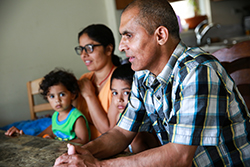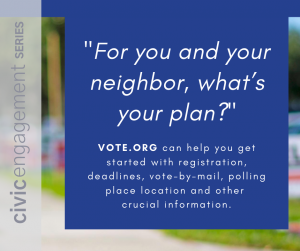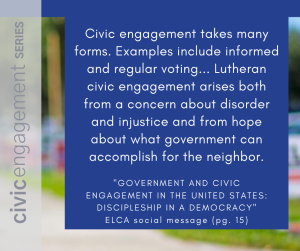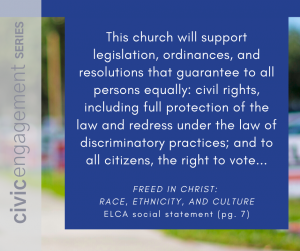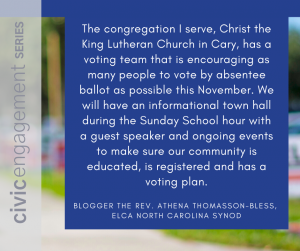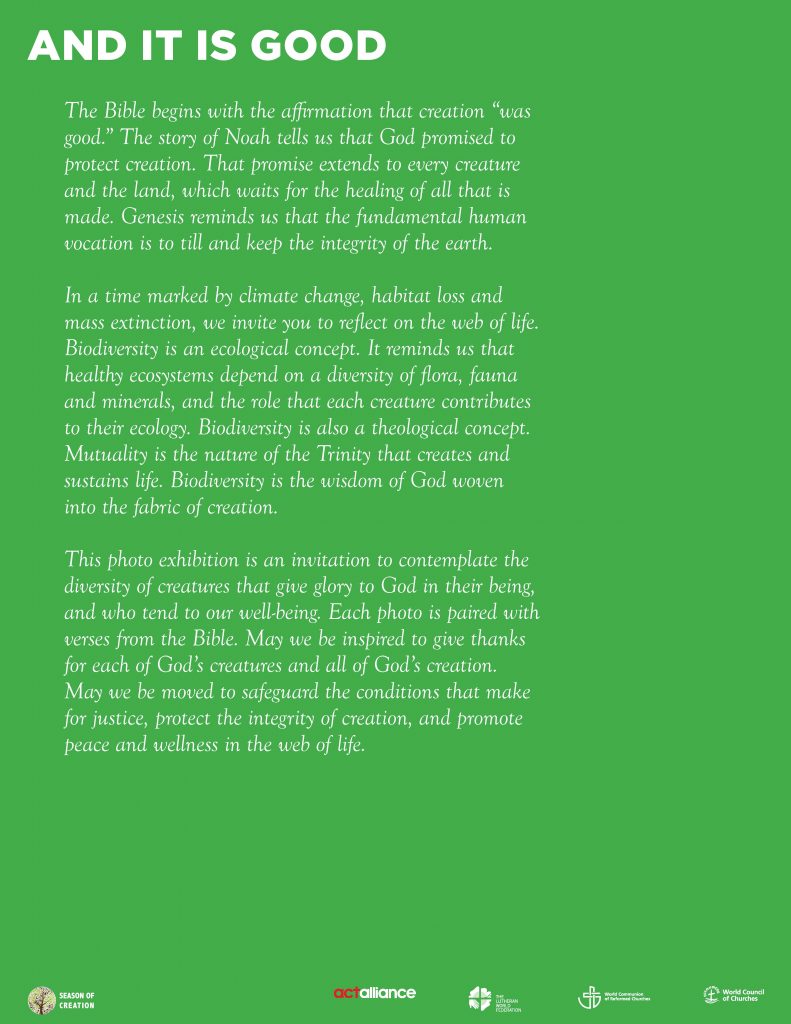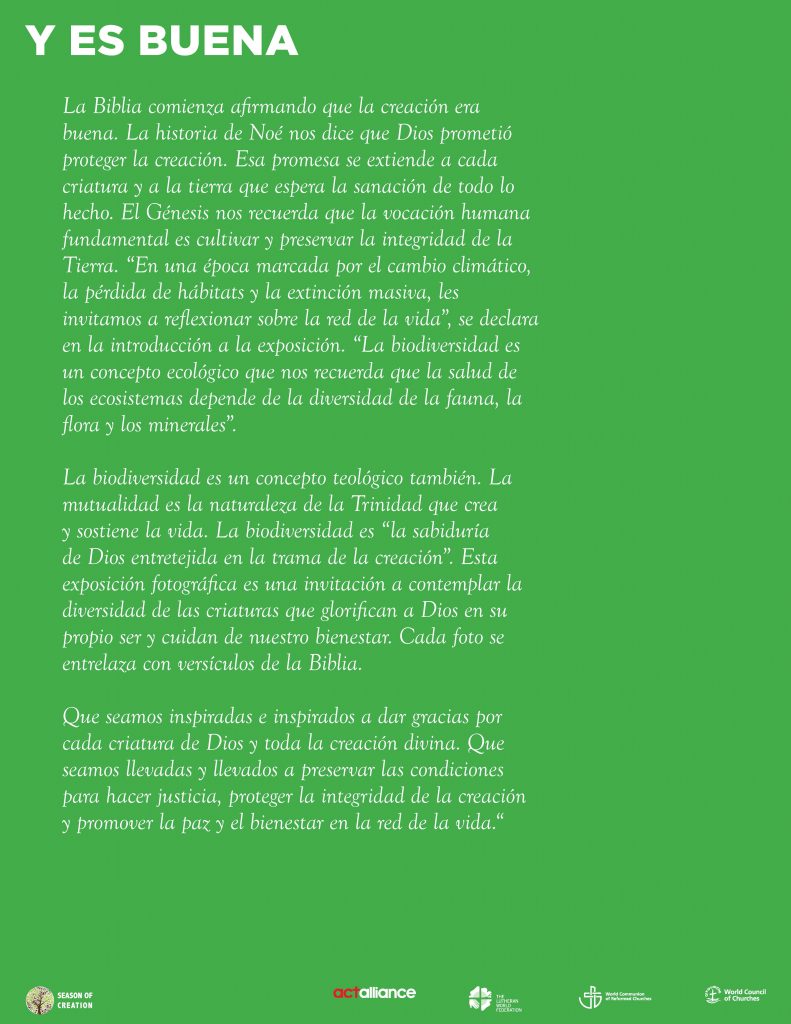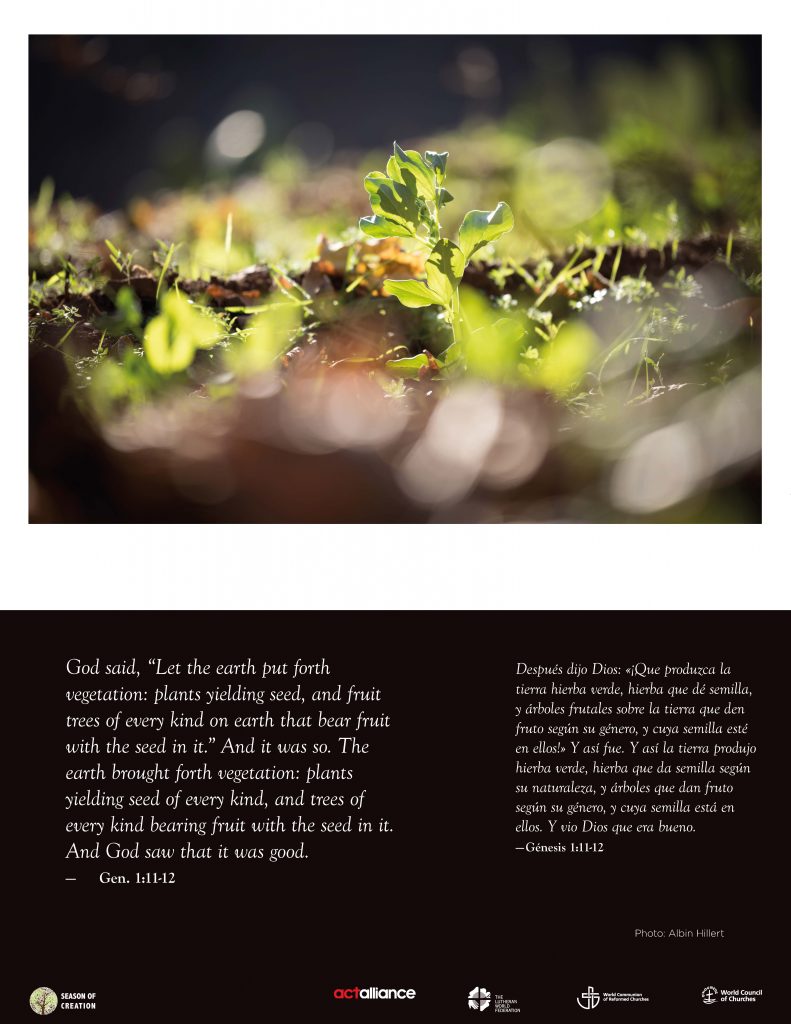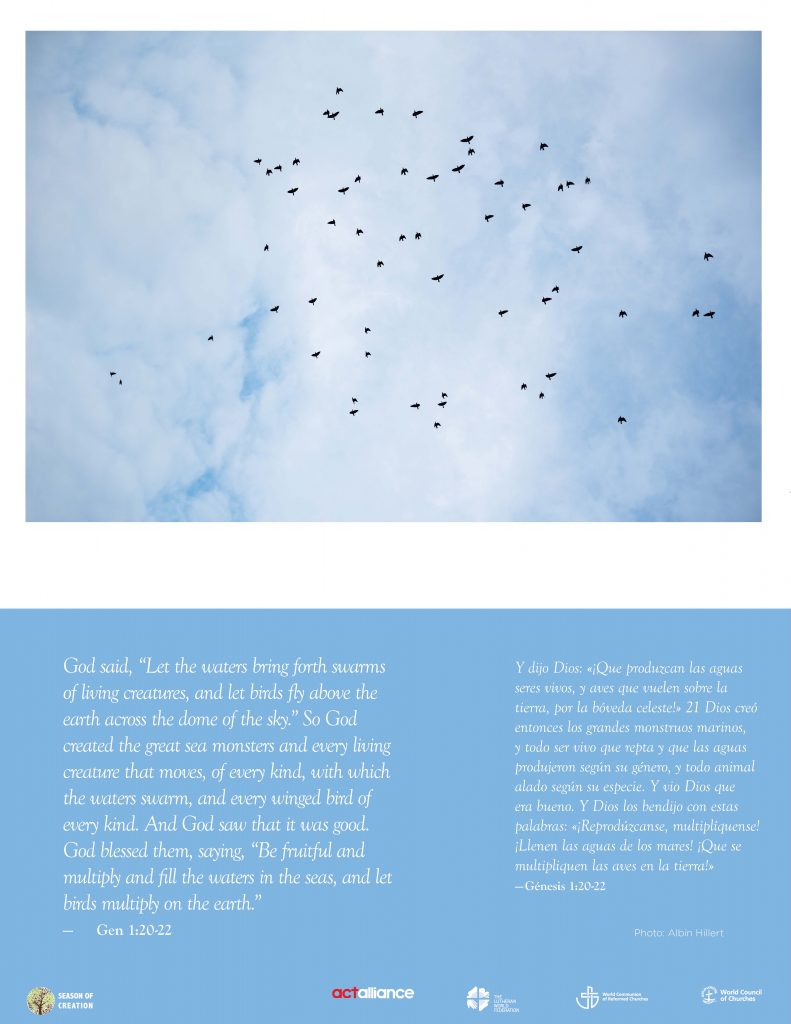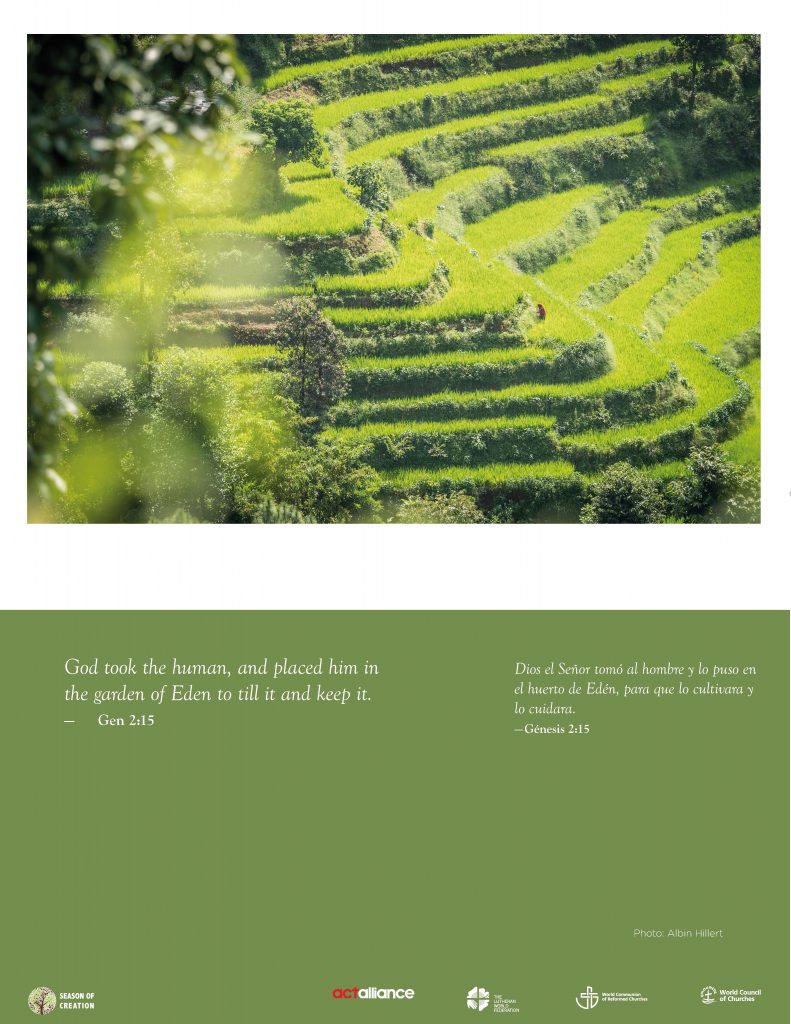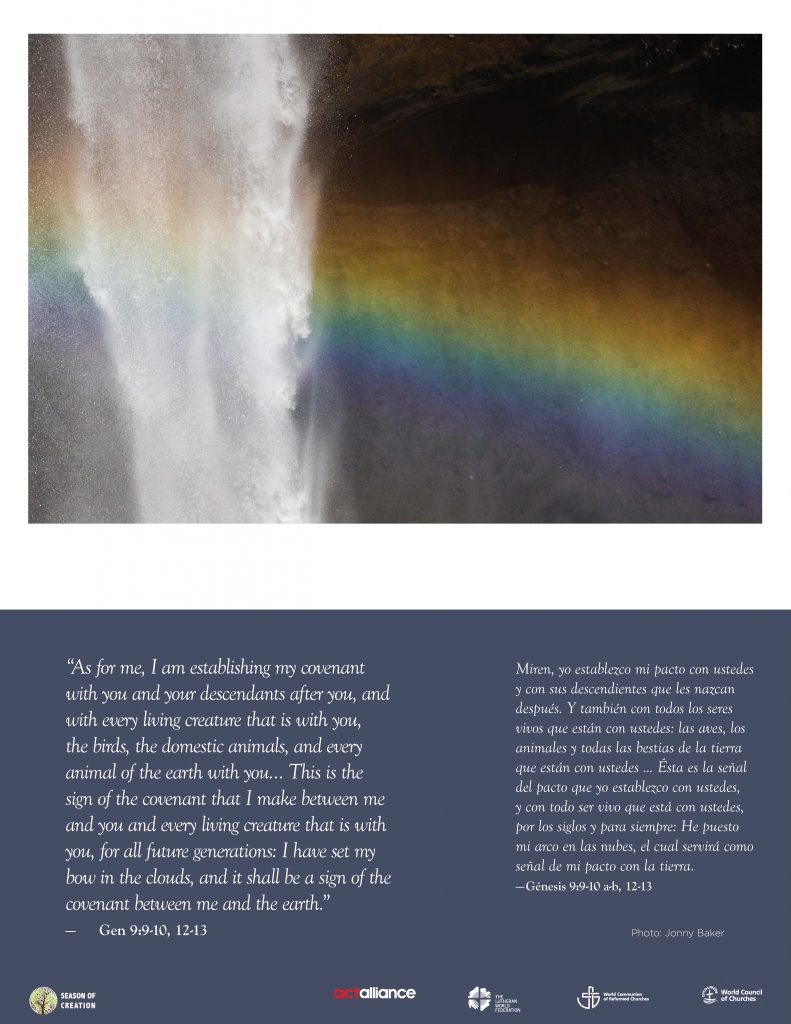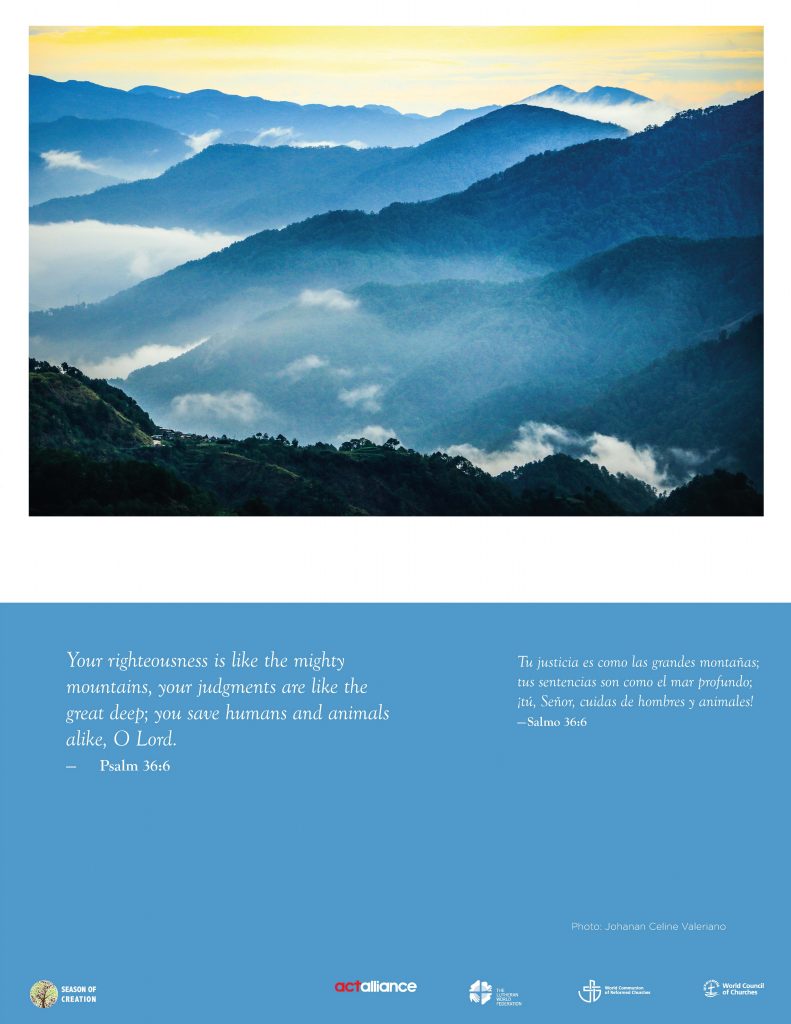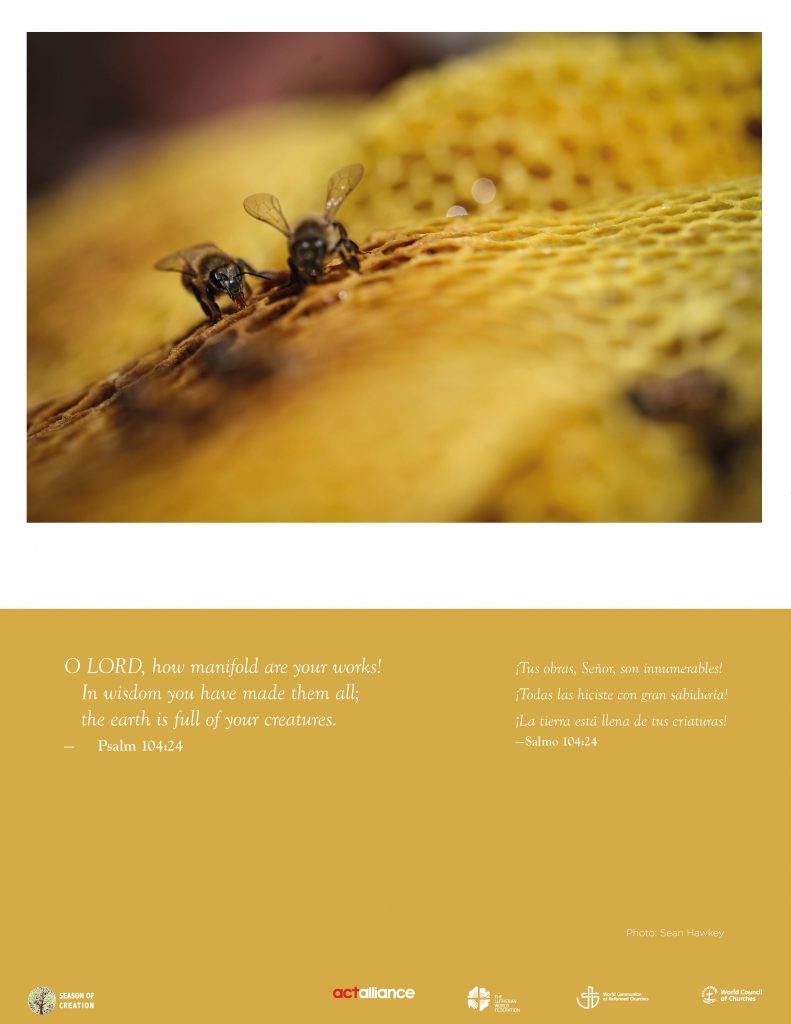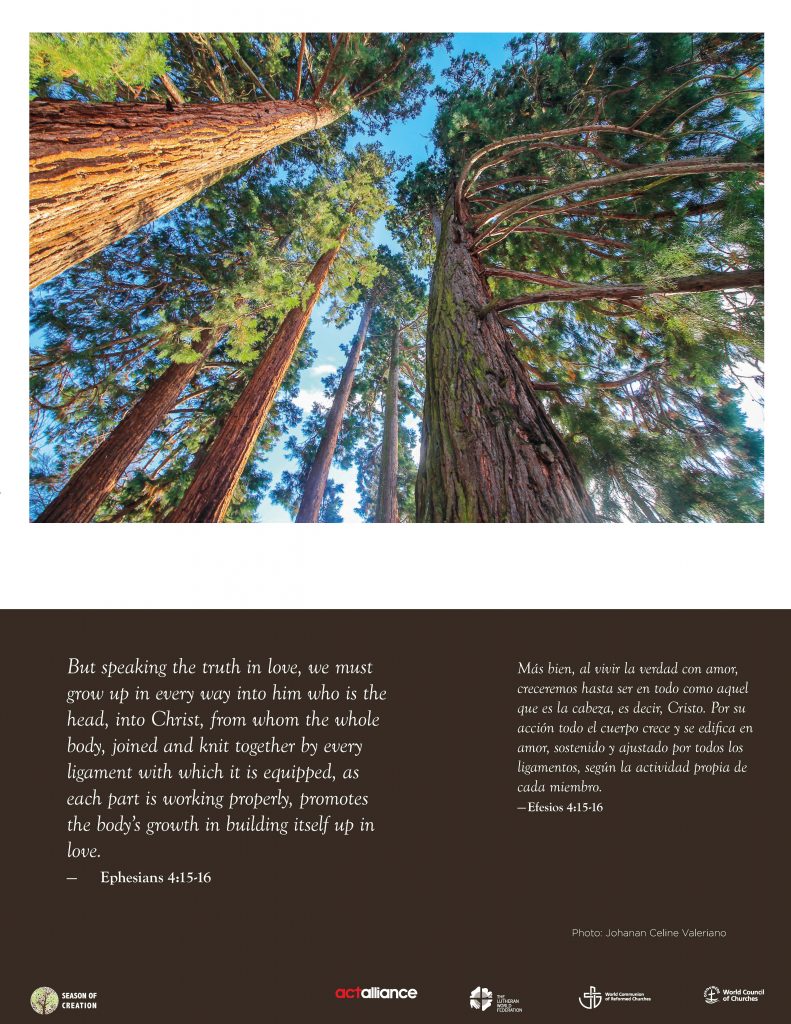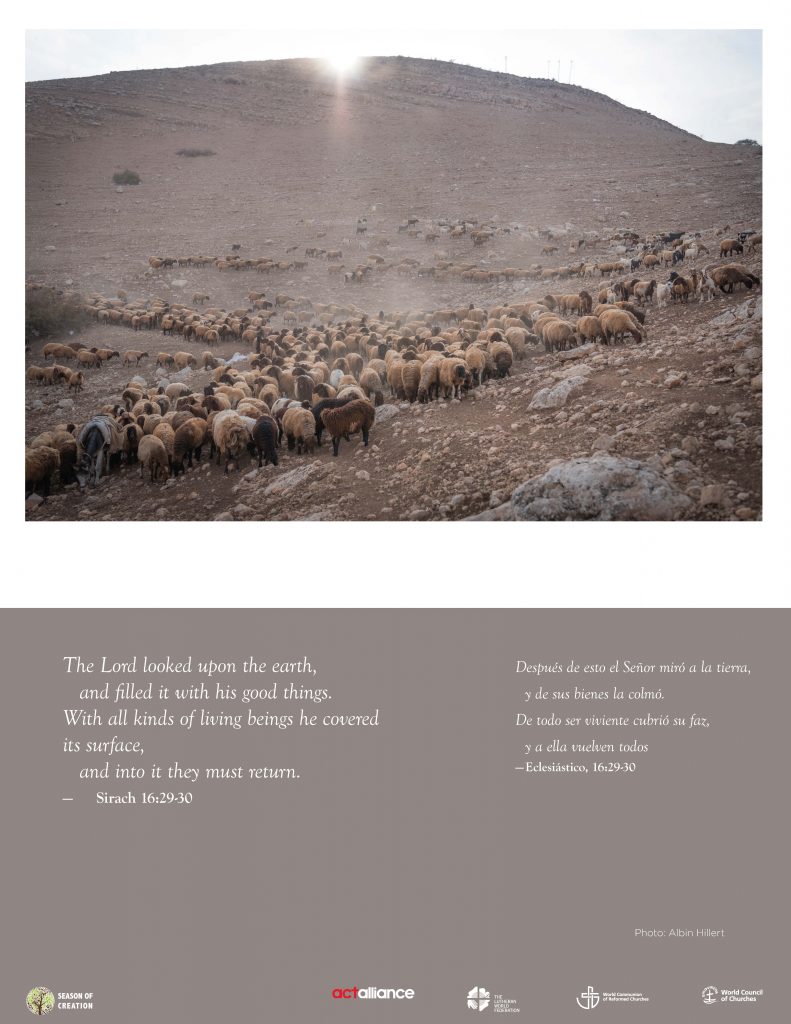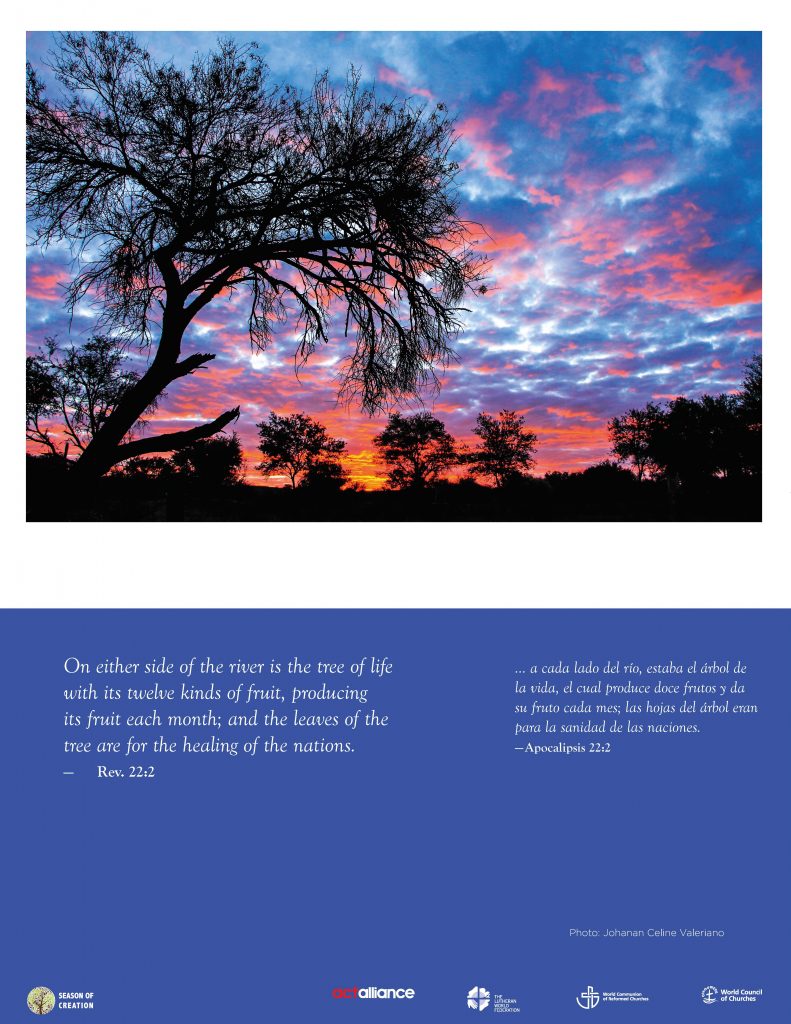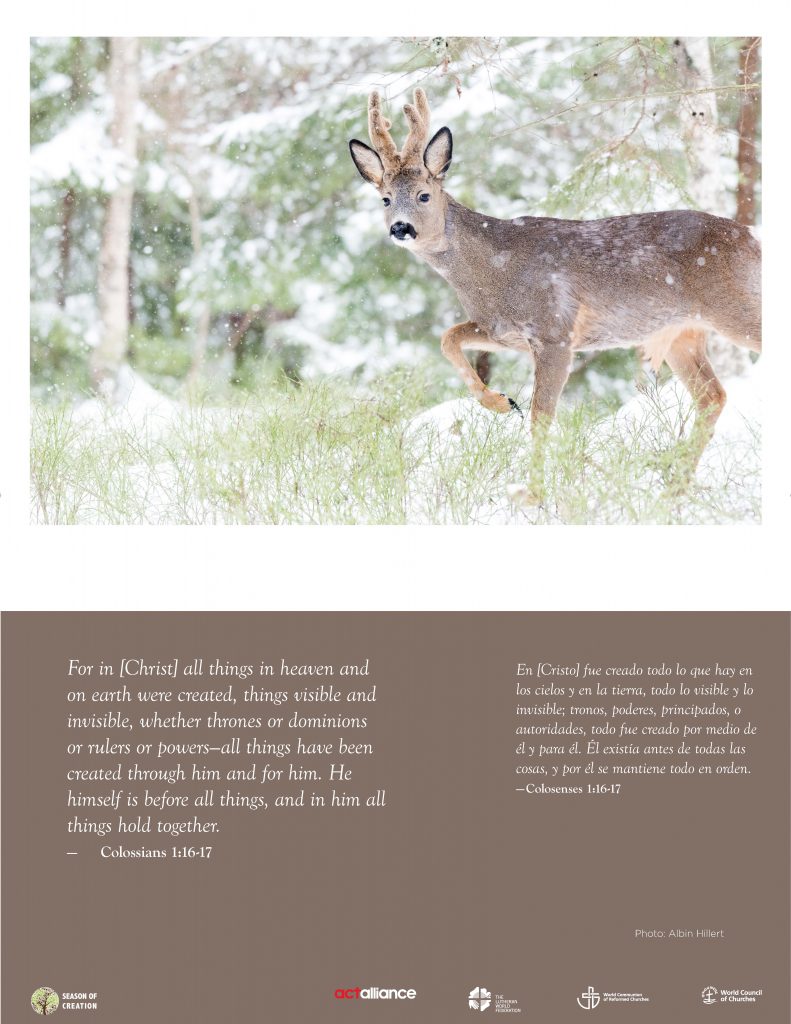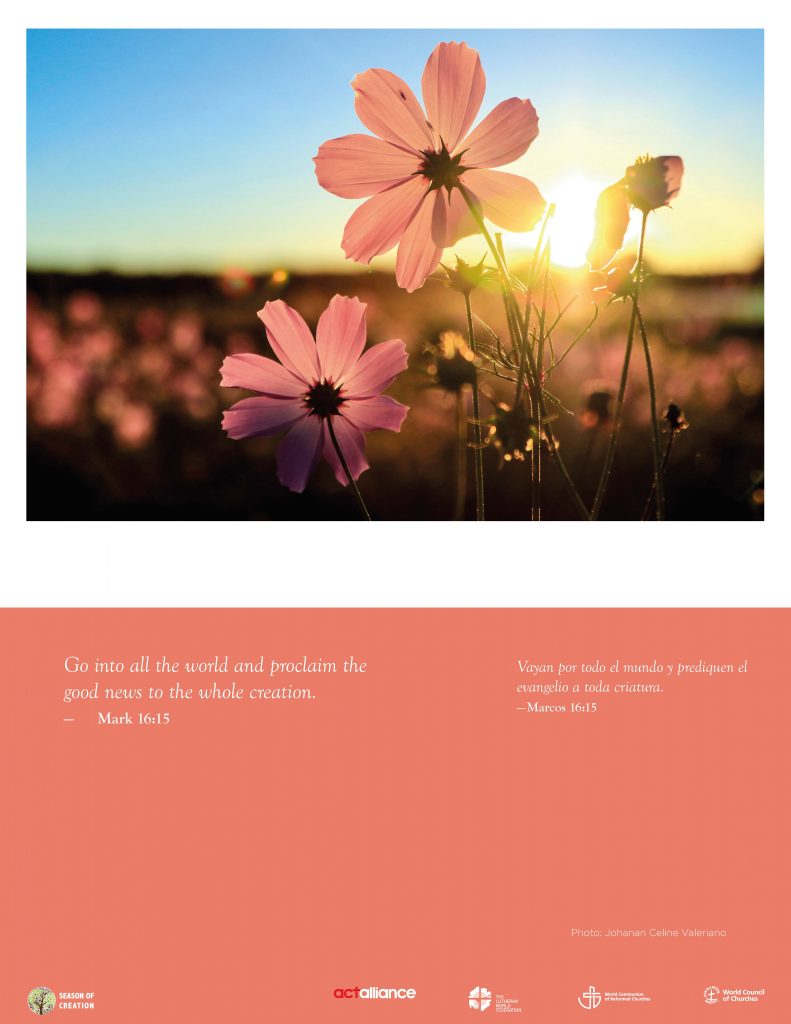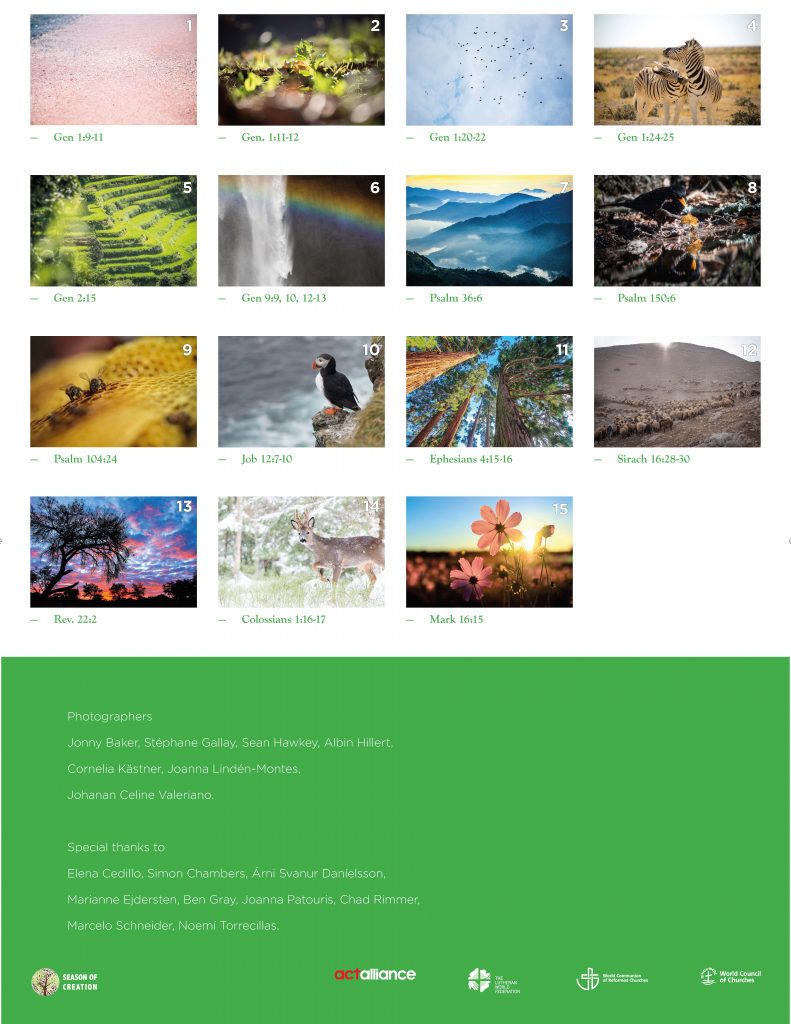Reprint* of post by Peter Severson, Director, Lutheran Advocacy Ministry-Colorado
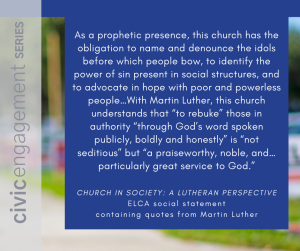 It seems almost trite to point out the deep and intense division in our modern political landscape in the United States. The contrast between worldviews among the different factions in our public life is so obvious, massive, and apparently unbridgeable that it seems like an immovable obstacle to which we just have to resign ourselves. It feels easier to just take it as a given, rather than to ask how it might be reconciled. It is a very tough environment in which to be a church premised on God’s reconciliation and love.
It seems almost trite to point out the deep and intense division in our modern political landscape in the United States. The contrast between worldviews among the different factions in our public life is so obvious, massive, and apparently unbridgeable that it seems like an immovable obstacle to which we just have to resign ourselves. It feels easier to just take it as a given, rather than to ask how it might be reconciled. It is a very tough environment in which to be a church premised on God’s reconciliation and love.
This, nonetheless, is the context in which the ELCA finds itself, called presently to speak into a riven reality, one where the only authentic public struggle seems to be the contest for power. We are called to be a church with faith active in love for God and for our neighbor. Love, in turn, “calls for justice in the relationships and structures of society.”1 But what are we to make of this call to be justice-seekers in a deeply divided world?
The Promise of Civility
For many, there is great appeal to placing our hope in the promise of a “return to civility.” Faced with the partisanship of a frequently-gridlocked Congress and White House, one might naturally see civility as a rescuer of public dialogue based on respect, integrity, and thoughtful consideration of opinions different from our own. Few observers would describe the overall tenor of our present discourse as ‘civil,’ much less respectful or dignified.
Perhaps for this reason, the ELCA was one of many religious denominations to draft and endorse a campaign called Golden Rule 2020: A Call for Dignity and Respect in Politics. The goals of the campaign, launched in November 2019, are twofold: one, to ask Christians to “pray for the healing of the divisions in our country” (meaning the United States), and two, to reflect on the Golden Rule in one’s ministry setting for the purpose of applying Christian principles to our political discourse.2
The call for civility in politics – which the campaign defines as showing dignity and respect for those who disagree with us – appeals across a broad swath of Christian traditions. The Golden Rule, to which the campaign’s name refers, can be found in many forms in many faiths: treat others as you would have them treat you. For Christians, this could be readily distilled from our Gospel call to love our neighbors as ourselves. As an ecumenical pursuit and as an implicit critique of the present incarnation of U.S. politics, the campaign is both timely and straightforward.
Holy Restlessness
The longer history of our country would suggest, however, that calls for civility do not always manifest as calls for dignity and respect, a posture for how to engage in dialogue. Such calls can be, and have been, deployed as cudgels against the holy and restless impatience of God’s justice-seeking people. When civility is taken to mean a critique of not just form but function and process, it can easily mutate into an obstacle to our critical participation in the social, economic, and political structures of our nation. It tells those who would publicly confront figures with calls for accountability that the act of confrontation itself is the real obstacle to reconciliation and progress, not the policies which those public figures enact or the norms they embody in their public conduct.
In this way, civility can morph into “an attempt to extend complicity” to those who would protest the brokenness evident in our public life – the move to deny health insurance to vulnerable populations, the separation of asylum-seeking families, the use of tax cuts for hyper-wealthy individuals as a justification for cutting social services to the poor – and to make it seem like those people who are speaking out are solely responsible for our loss of public comity.3 But it is precisely such policies that are the source of the rift itself. They stir the outrage of those who want our economic and social systems to care for the poor.
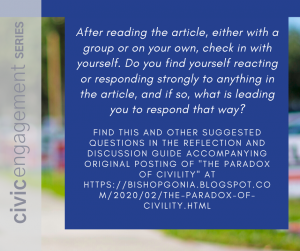 When used as a model for dialogue, civility can be a posture of conciliation and respectful engagement. This seems to be the intent behind the Golden Rule 2020 campaign. Unfortunately, civility has often been deployed in other contexts of our public life as a pretext for silencing the urgency of demands for justice. Politicians are increasingly wont to praise civility and disparage public confrontation (especially when they are the ones being confronted). Such calls for civility are often “little more than a plea on the part of those who benefit from the status quo to be spared the discomfort of acknowledging or addressing the pain of others.”4 But these are the wages of being a public servant in a democracy: that one must, occasionally, confront the actual public who is ostensibly being served. For the sake of the urgent needs of our neighbors, people of faith cannot obsequiously continue to prioritize the comfort of those in power. Quite the opposite, in fact.
When used as a model for dialogue, civility can be a posture of conciliation and respectful engagement. This seems to be the intent behind the Golden Rule 2020 campaign. Unfortunately, civility has often been deployed in other contexts of our public life as a pretext for silencing the urgency of demands for justice. Politicians are increasingly wont to praise civility and disparage public confrontation (especially when they are the ones being confronted). Such calls for civility are often “little more than a plea on the part of those who benefit from the status quo to be spared the discomfort of acknowledging or addressing the pain of others.”4 But these are the wages of being a public servant in a democracy: that one must, occasionally, confront the actual public who is ostensibly being served. For the sake of the urgent needs of our neighbors, people of faith cannot obsequiously continue to prioritize the comfort of those in power. Quite the opposite, in fact.
Other critiques might suggest that a call for civility is naïve, or that the ship has sailed on any attempt to revive civil discourse into our political process – that 2016 was, in effect, a Rubicon of cheapened discourse beyond which we cannot return. And one could argue that the dichotomous framing of the campaign itself (with an emphasized letter “D” and letter “R” in its logo, along with binary red and blue color motifs) also buys into the Manichaean two-party gridlock that deeply infects U.S. politics, foreclosing our imagination from other ways of being that are not solely Democratic or Republican partisanship.
A Refuge from Exhaustion
It would be a mistake, though, to presume that civility’s distortion as a rhetorical weapon means that there is no place for civil discourse in our politics. Put simply, it is not bad to wish for a more elevated and dignified form of politics. Public opinion polls suggest that many Americans are exhausted by the addiction to rage, tabloid sensationalism, and zero-sum approaches to politics coverage in our media and public life. For the church to function as a place of refuge from this exhaustion is entirely appropriate. Jesus extends this invitation to all of us: “Come to me, all you that are weary and are carrying heavy burdens, and I will give you rest.”5 In that context, the church can be a place which calls for a politics that upholds dignity, respect, and love.
It is also true that Christian people are at different stages of their journey toward imagining and pursuing a politics not addicted to rage, fear, and demonization of others. Some people of faith may be ready to forcefully critique the structures and institutions of our broken and sinful world, while others are simply desiring to imagine ways to talk to their divided families, neighbors and friends. All people need to continue to wrestle deeply with the meaning of the Gospel’s call to love our neighbors. As much as we may wish for urgency in the task of pursuing a reconciled civic discourse, not everyone walks from the same place or at the same pace. Endorsing a resource that supports those for whom beginning with civility is productive is a good thing. At the same time, it must neither be our only resource nor our only framing of what God requires from us in the present moment.
To What Are We Called?
The emergent question is this: to what are we called? How can we be a church for the sake of the world, a light to show God’s love? For one, we can proclaim the gift of the Gospel, which “does not allow the Church to accommodate to the ways of the world.” We can remember that “the presence and promise of God’s reign makes the Church restless and discontented with the world’s brokenness and violence. Acting for the sake of God’s world requires resisting and struggling against the evils of the world.”6
In doing so, we can affirm that calling the powerful to account for how they propose to treat the poor, the orphan, and the stranger is a holy task. Sometimes that struggle may mean publicly addressing the powerful. Sometimes it may mean meeting privately with a decision-maker to exchange views. Sometimes it may mean testifying at a rally, or testifying on legislation. It may mean living out a counterexample in our own lives, caring for the needs of others in an immediate, tangible way. And it may mean learning how to converse civilly with our neighbors in our own congregation or ministry setting.
These ways of struggling to address the suffering and brokenness of the world can all be faithful. Jesus met with religious authorities and cared for the bodily needs of the common people. Jesus subjected himself to the power of the empire – a power which would eventually kill him – but not before charging into the Temple to flip over the tables of usurious money-lenders. Loving but persistent confrontation with prevailing authorities marked Jesus’ ministry on Earth, as did speaking to, teaching, and healing individual people.7
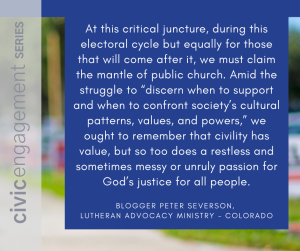 The Gospel proclaims God’s love for all people, including those who are powerful decision-makers and those on the margins. Through our Lutheran understanding of vocation, we know that some people are called into public service to make policy on behalf of the body politic, while others are called to agitate for change. All of us broken, imperfect sinners have various vocational callings in the world. Regardless of what the call is, God does not leave us alone in it: “In witnessing to Jesus Christ, the Church announces that the God who justifies expects all people to do justice.”8 How do we treat our poorest neighbors? How do we show love, compassion, and respect for all people, regardless of how the world might try to inflate or diminish their inherent value? As people of faith, we believe that God calls us to hold the powerful accountable for how they answer these questions. As a church, we respect “the God-given integrity and tasks of governing authorities and other worldly structures, while holding them accountable to God.”9
The Gospel proclaims God’s love for all people, including those who are powerful decision-makers and those on the margins. Through our Lutheran understanding of vocation, we know that some people are called into public service to make policy on behalf of the body politic, while others are called to agitate for change. All of us broken, imperfect sinners have various vocational callings in the world. Regardless of what the call is, God does not leave us alone in it: “In witnessing to Jesus Christ, the Church announces that the God who justifies expects all people to do justice.”8 How do we treat our poorest neighbors? How do we show love, compassion, and respect for all people, regardless of how the world might try to inflate or diminish their inherent value? As people of faith, we believe that God calls us to hold the powerful accountable for how they answer these questions. As a church, we respect “the God-given integrity and tasks of governing authorities and other worldly structures, while holding them accountable to God.”9
It is a gift from God that our ultimate hope is not in perfectly accomplishing this work. Politics can be a “prudential way to secure justice, beat back evil, and mitigate the effects of the Fall.”10 But it is also not the appropriate forum in which to place our hope of salvation. We should have no illusions about our political ingenuity – civility, activism, and otherwise – fully escaping the brokenness and sinfulness of the world; in short, we cannot expect to “legislate our way to the kingdom” by deifying the potential of human activity.11 Our call in this arena is not to ultimacy, but to pursue justice in a world where we will nonetheless have to keep praying for God’s coming reign.
Conclusion
At this critical juncture, during this electoral cycle but equally for those that will come after it, we must claim the mantle of public church. Amid the struggle to “discern when to support and when to confront society’s cultural patterns, values, and powers,” we ought to remember that civility has value, but so too does a restless and sometimes messy or unruly passion for God’s justice for all people.12 We are called, as the hymn says, to act with justice, and to love tenderly, and to serve one another: to walk humbly with God.13 The Gospel does not promise that this walk will necessarily be easy or comfortable. But it is in the liberation of a life lived in faithfulness to Christ that we draw on the strength of our community in the church, as well as those justice-seekers outside the church, to keep going.
“You must feel with sorrow…all the unjust suffering of the innocent, with which the world is everywhere filled to overflowing. You must fight, work, pray, and – if you cannot do more – have heartfelt sympathy.”14
ORIGINAL ENDNOTES
1 ELCA Social Statement, “The Church in Society: A Lutheran Perspective” (1991)
2 https://goldenrule2020.org/
3 Jonathan Sturgeon, “American Jekyll, American Hyde,” The Baffler (July 20, 2018)
4 Maximilian Alvarez, “Don’t Let Them Win,” The Baffler (June 29, 2018)
5 Matthew 11:28, NRSV
6 ELCA Social Statement, The Church in Society: A Lutheran Perspective
7 Cf. Cynthia Moe-Lobeda, Public Church: For the Life of the World (2004)
8 ELCA Social Statement, The Church in Society: A Lutheran Perspective
9 Ibid.
10 James K.A. Smith, On the Road with Saint Augustine (2019), 190-191
11 Ibid.
12 ELCA Social Statement, The Church in Society: A Lutheran Perspective
13 Evangelical Lutheran Worship #720
14 Martin Luther, “The Blessed Sacrament of the Holy and True Body of Christ, and the Brotherhoods”
* “The Paradox of Civility Reflection and Discussion Guide” accompanies the original post reprinted here by permission to the blog of Bishop Jim Gonia, ELCA Rocky Mountain Synod (2/11/20).

